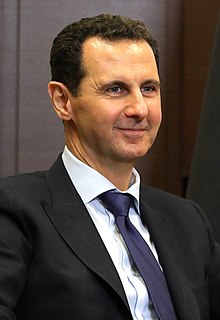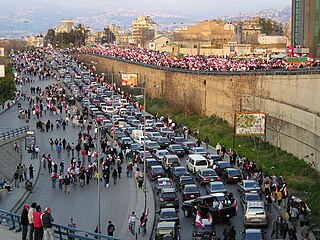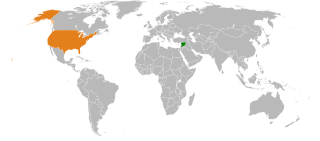Related Research Articles

Hezbollah is a Lebanese Shia Islamist political party and militant group, led by its Secretary-General Hassan Nasrallah since 1992. Hezbollah's paramilitary wing is the Jihad Council, and its political wing is the Loyalty to the Resistance Bloc party in the Lebanese Parliament. Either the entire organization or only its military wing has been designated a terrorist organization by several countries, including by the European Union and, since 2017, also by most member states of the Arab League, with two exceptions – Lebanon, where Hezbollah is the most powerful political party, and Iraq. Russia does not view Hezbollah as a "terrorist organization" but as a "legitimate socio-political force".

Lebanon, officially known as the Lebanese Republic, is a country in Western Asia. It is bordered by Syria to the north and east and Israel to the south, while Cyprus lies to its west across the Mediterranean Sea; its location at the crossroads of the Mediterranean Basin and the Arabian hinterland has contributed to its rich history and shaped a cultural identity of religious diversity. Lebanon is home to roughly six million people and covers an area of 10,452 square kilometres (4,036 sq mi), making it one of the smallest countries in the world. The official language of the state is Arabic, while French is also formally recognized; the Lebanese dialect of Arabic is used alongside Modern Standard Arabic throughout the country.
This article concerns the systems of communication in Lebanon. Lebanon possesses a number of systems of telecommunication. The country code and top-level domain for Lebanon is ".lb".

The Syrian Arab Armed Forces are the military forces of the Syrian Arab Republic. They consist of the Syrian Arab Army, Syrian Arab Air Force, Syrian Arab Navy, Syrian Arab Air Defense Force, and paramilitary forces, such as the National Defence Force. According to the Syrian constitution, the President of Syria is the Commander-in-Chief of the Armed Forces.

Bashar Hafez al-Assad is a Syrian politician who is the 19th president of Syria, since 17 July 2000. In addition, he is the commander-in-chief of the Syrian Armed Forces and the Secretary-General of the Central Command of the Arab Socialist Ba'ath Party. His father, Hafez al-Assad, was the president of Syria before him, serving from 1971 to 2000.

Amine Pierre Gemayel is a Lebanese Maronite politician who served as President of Lebanon from 1982 to 1988.

The Lebanese Forces is a Lebanese Christian-based political party and former militia during the Lebanese Civil War. It currently holds fifteen of the 64 Christian seats in Lebanon's parliament and is therefore the second-largest Christian party in parliament.

Christianity in Lebanon has a long and continuous history. Biblical Scriptures purport that Peter and Paul evangelized the Phoenicians, whom they affiliated to the ancient patriarchate of Antioch. The spread of Christianity in Lebanon was very slow where paganism persisted especially in the mountaintop strongholds of Mount Lebanon. A 2015 study estimates some 2,500 Lebanese Christians have Muslim ancestry, whereas the majority of Lebanese Christians are direct descendants of the original early Christians.

The Syrian occupation of Lebanon began in 1976, during the Lebanese Civil War, and ended in 2005 following the assassination of former Lebanese Prime Minister Rafic Hariri.

Al Akhbar is a daily Arabic language newspaper published in a semi tabloid format in Beirut. Until 2015, it also had an English version published on the Internet.

I-ME-WE is a 13,000-kilometre (8,100 mi) submarine communications cable system between India and France. The design capacity is 3.84 Terabits per second. It has been operational since 2009 with Tripoli, Lebanon being connected in November 2011. Internet Service Providers and Network Operators hope to utilize the additional bandwidth to support high-bandwidth peer-to-peer IP-based broadband services such as multimedia streaming, broadband Internet and voice/video telephony.

Diplomatic relations between Syria and the United States are currently non-existent; they were suspended in 2012 after the onset of the Syrian Civil War. Priority issues between the two states include the Arab–Israeli conflict, the Golan Heights annexation, and the Iraq War.
Israel–Lebanon relations have experienced ups and downs since their establishment in the 1940s. Lebanon did take a formal part in the 1948 Arab-Israeli War against Israel, but Lebanon was the first Arab league nation to signal a desire for an armistice treaty with Israel in 1949. Lebanon did not participate in the Six-Day War in 1967 nor the Yom Kippur War in 1973 in any significant way, and until the early 1970s Lebanon's border with Israel was the calmest frontier between Israel and any of the other adjacent Arab League states. The most turbulent period in binational relations was 1970s and 1980s, upon the Lebanese Civil War. During the first stages of the war, Israel allied with major Christian Lebanese militias which led the Lebanese government during the early 1980s. The countries effectively reached normalization of relations with US-brokered May 17 Agreement in 1983, but it had been annulled by Lebanon after power takeover by Druze and Shiite militias in early 1984. Israel also supported the secessionist Free Lebanon State during 1979–1984 and its successor South Lebanon Army.
CADMOS is a submarine telecommunications cable system in the Mediterranean Sea linking Cyprus and the Lebanon.
ALETAR is a submarine telecommunications cable system in the Mediterranean Sea linking Egypt and Syria.
UGARIT is a submarine telecommunications cable system in the Mediterranean Sea linking Cyprus and Syria.
Content from the United States diplomatic cables leak has depicted the United States' opinion of the Middle East-related subjects extensively. WikiLeaks has published these classified documents, diplomatic cables, between the United States Department of State and its diplomatic missions around the world. Many previously unknown statements or opinions about a variety of Middle Eastern topics have been revealed.
The CS Chamarel, originally CS Vercors was a cable layer owned by France Telecom Marine, laying submarine communications cables around the world. It was built in 1974 and destroyed by a fire in August 2012. As the Vercors, the ship laid cables on and between all continents except Antarctica, including numerous trans-Atlantic cables and the first ever Israeli-made cable, and set the record for the deepest submarine buried cable lay in 2000. The ship was badly damaged by a fire in August 2012.
Lebanon's role in the Syrian Civil War has been limited, compared to the role of other regional and international actors. Lebanese Republic has not been officially involved in the conflict, but has been greatly affected by it and some Lebanese factors have taken an active role in the Syrian War and its spillover into Lebanon.
References
- "Syria - Lebanon Fiber Optic Submarine cable - Berytar". Archived from the original on 2008-08-29. Retrieved 2008-10-14.